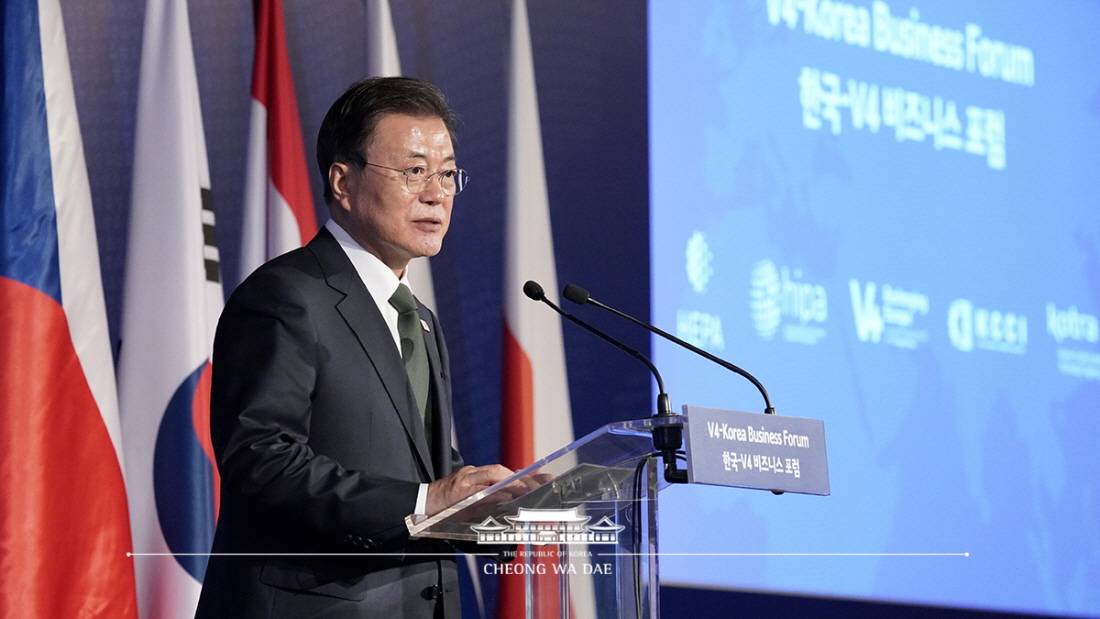이 웹사이트는 제19대 대통령 임기 종료에 따라 대통령기록관이 「대통령기록물 관리에 관한 법률」에 의해 이관받아 서비스하는 대통령기록물입니다. 자료의 열람만 가능하며 수정 · 추가 · 삭제는 불가능합니다.
다만, 「개인정보보호법」에 의하여 개인의 정보를 보호받기 원하시는 분은 관련 내용(요청자, 요청내용, 연락처, 글위치)을 대통령 웹기록물 담당자(044-211-2253)에게 요청해 주시면 신속히 검토하여 조치해 드리겠습니다. 감사합니다.
SPEECHES & REMARKS
BRIEFINGS

Business leaders from the Visegrád Group and Korea,
I am pleased to meet you all.
We have affirmed our trust while prevailing over difficulties. There are very many things to cooperate on and achieve together going forward. I hope today’s event will serve as an opportunity to hasten the arrival of our recovery and takeoff.
I am deeply grateful to Prime Minister Orbán, Hungarian Export Promotion Agency CEO Szabó, Hungarian Chamber of Commerce and Industry Chairman Parragh and Korea Chamber of Commerce and Industry Chairman Chey Tae-won for arranging this invaluable event and opportunity for us to come together.
Distinguished business leaders,
In June 1989, Samsung Electronics opened its TV factory in the small Hungarian city of Jászfényszaru. That was the beginning of economic cooperation between the V4 and Korea. This factory that once made 400 TVs per day is now manufacturing 40,000 sets daily. As a global production base, the factory is exporting TVs to all of Europe and has grown into the region’s leading company, employing half of Jászfényszaru’s population.
Since V4 countries joined the European Union, Korean businesses have vibrantly participated in the automobile industry, one of the V4’s main economic driving forces. The scope of bilateral cooperation has also been broadened.
Since 2007, Hyundai-Kia Motors has been operating factories in Nošovice in the northeastern part of the Czech Republic and in Žilina its northwestern Slovakia. Once a sequestered rustic village, Nošovice has now become the heart of the Czech Republic’s automobile industry.
Žilina, one of Slovakia’s three industrial cities, has been equipped with a new growth engine – automobiles – in addition to its chemical engineering and construction industries. Those Hyundai-Kia factories have an annual production capacity of 350,000 cars each; they account for over 7 percent of the automaker’s global production.
Mutually beneficial cooperation between Korea and the V4 region has produced tremendous outcomes. More than 600 Korean businesses from various industries – electronics, automobile manufacturing and parts, chemical and steel – have advanced into the V4, and our accumulated investments here have surpassed US$10 billion, making it Korea’s largest investment destination in the European Union.
Trade has also increased rapidly. Even amid the COVID-19 situation last year, it reached an all-time high of US$16.8 billion, and this year – having increased by more than 30 percent – it is about to surpass US$20 billion.
However, this is still just the beginning. With its excellent workforce and geographical advantages – connecting Eastern and Western Europe – the V4 is growing more dynamically than any part of Europe. Korea, with its strengths in high-tech manufacturing, desires to grow along with the V4. I look forward to both sides moving together, beyond the European market, to reach every corner of the world.
To this end, I’d like to highlight economic cooperation in three sectors today.
First is cooperation in electric vehicle batteries. Korea’s leading battery manufacturers have all built large-scale production bases in the V4 already. This year, the Hungarian Government decided to provide US$100 million to SK Innovation’s second plant under construction in Komárom. SK Innovation also announced its plan to establish a third plant with an additional US$1.1 billion investment. These are symbolic examples of mutually beneficial, cooperative relations between the V4 and Korea.
Second is cooperation in new industries in the post-COVID-19 era. Since the outbreak of COVID-19, the world has been speeding up its digital and green transitions. If the V4’s capacities in basic science and technology are combined with Korea’s applied science and technology, we will be at the forefront of change.
In particular, I hope that we will join forces to nurture an economy based on hydrogen – a future energy source with infinite potential. One V4 country after the other has announced its national hydrogen strategy this year. Korea is also realizing its vision of becoming a leading hydrogen economy nation. As our goals are the same, the synergy from cooperation will be tremendous.
I would like to see the V4 and Korea jointly foster the biohealth industry, whose importance has risen following the COVID-19 outbreak. Our bilateral biohealth trade increased more than 100-fold last year as we shared epidemic prevention and control supplies. I look forward to our ongoing cooperation making it possible to respond jointly to future infectious disease threats.
Third is cooperation in infrastructure. Korean companies are participating in various infrastructure projects in the V4 such as the construction of a PDH/PP Plant in Poland’s Police County and a tram replacement project in Warsaw. I hope that Korea will be able to participate in new projects like the construction of Warsaw’s new airport and the modernization of Bratislava Airport in Slovakia.
Business leaders from the Visegrád Group and Korea,
Through the seven MOUs in the green, digital, biohealth and other sectors to be signed today, cooperation between our two sides will be further strengthened.
The 2nd V4-Korea Summit will be held tomorrow. It will be a great opportunity to share the opinions of business leaders with the V4’s prime ministers. It will be a chance to gather wisdom for mutually beneficial development. With today’s meeting, our friendship will deepen further, and the V4 and Korean economies will make a vigorous leap forward.
Thank you.



